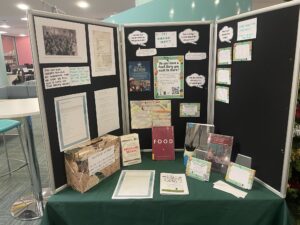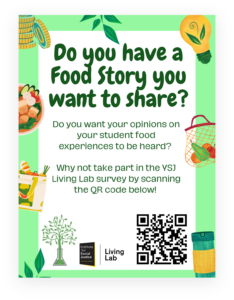‘YSJ Food Stories – student culinary culture in the cost-of-living crisis’ builds on the Cookbook. Led by students from across disciplines, the Living Lab will continue to deepen our understanding of these issues by gathering more student stories and sharing them as a form of activism: as films, publications, practical kits, and campaigns. Hear from History student Ania about their time on placement with the Living Lab project.
My name’s Ania, I’m a history student at York St John and am currently in my second year. Recently I h ad a chance to participate in the Living Lab Food Stories project. This started when I had to complete a placement for one of my modules and we had a talk from Vicki (from the Institute for Social Justice) in one of my lectures. She described an opportunity to deepen my understanding of food issues faced by students by gathering student stories and sharing them through different mediums.
ad a chance to participate in the Living Lab Food Stories project. This started when I had to complete a placement for one of my modules and we had a talk from Vicki (from the Institute for Social Justice) in one of my lectures. She described an opportunity to deepen my understanding of food issues faced by students by gathering student stories and sharing them through different mediums.
I knew that this project would be an engaging and valuable learning experience, as it offered a great deal of independence and freedom, allowing me to mould the project to my own ideas. This project also particularly resonated with me as I have coeliac disease and need to follow a strict gluten-free diet. My food is often more expensive than ‘normal’ food and this is something that I feel is not commonly known. I’m passionate about raising awareness around the challenges that come with food allergies and intolerances, especially in a cost of living crisis.
As a history student, I had the opportunity to work on a project where I was responsible for collecting and curating student stories. I wanted to raise awareness about the social impact of students with food intolerances and/or tight weekly budgets through this project. You might have come across the posters that were put up around campus asking if you had a food story you wanted to share – well, those were created by me and another history student on this project, and it was exciting to see people respond to them. We created an online survey, set up an interactive library display, and conducted and transcribed an interview. These were all completely new experiences for us, but we felt a sense of achievement from doing them. Our ultimate goal was to keep the project as open as possible so that whoever takes over in the next semester can use our findings to create a final product. It was a worthy experience, and I’m so glad I got involved with it.
well, those were created by me and another history student on this project, and it was exciting to see people respond to them. We created an online survey, set up an interactive library display, and conducted and transcribed an interview. These were all completely new experiences for us, but we felt a sense of achievement from doing them. Our ultimate goal was to keep the project as open as possible so that whoever takes over in the next semester can use our findings to create a final product. It was a worthy experience, and I’m so glad I got involved with it.
Although I was only involved in the initial stages of this project, it was a fantastic opportunity to be a part of something bigger. Have you ever stopped to think about how much of our lives revolve around food? From whipping up a delicious meal to sharing a takeaway with friends, it’s now clear to me that food plays a huge role in our personal well-being and social lives. The impact of our budget plays a huge part in the food we interact with, making me realise that everyone has a unique relationship with food. It’s been really interesting to see how it shapes our day-to-day experiences.
If you get the chance, I highly recommend getting involved in this project. It’s a great way to help preserve the living history of current students and provide future students with a glimpse into our lives. When I first heard about the Living Lab, I didn’t have much interest in student experiences with student living expenses and food stories. However, since joining the Living Lab, I have developed an interest in this topic. Therefore, I strongly recommend that anyone interested should sign up and give it a try even if this topic isn’t something you’ve thought about before.
I feel that my confidence has grown since joining this project because it has challenged me to try new things that I wouldn’t have had the chance to do. It is an excellent opportunity for creative individuals who want to document genuine student experiences.
All students are welcome to get involved in this interdisciplinary project. Please do get in touch if you would like to join workshops and story collecting or editing sessions.
To join the Moodle page email c.heinemeyer@yorksj.ac.uk.


